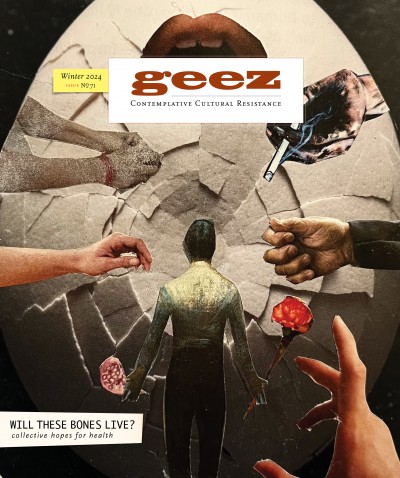The Fight for Justice Is Everyone’s Fight
“The Future Is Mutual Aid,” Olly Costello, 2020, An Expanding Sense of Self Series, mollycostello.com
I think it started when I first felt my own humanity being diminished. Not that I understood my feelings or had the words for them as a 6-year-old eager to be accepted at my new school. I came to the United States as a foreigner, or at least it was made clear that I was seen as one. What started back then was a sense of rebellion, protest – to fight against the box I was being put in, and the injustice of being regarded as something less than human because of how I looked.
It grew significantly when I experienced, as a teenager, how it feels when people dismiss you when you’re vulnerable, scared, and trusting others to provide care. I was with my mother, who was suffering from a debilitating illness, at doctor’s appointments. We were hoping for answers yet finding that a diagnosis and effective treatments were elusive. Perhaps it was some combination of overwhelming workloads and a lack of training and resources, but it was clearly felt that my mother was neither seen nor heard at multiple clinics because she was a “foreigner.” I went from scared to angry and started searching for how I could fight against the unjust forces in front of me.
That fight was also nurtured at church where I connected my faith to being called to fight for justice. My faith tells me that believing in the greater good in the world requires contributing to that greater good and fighting for justice. By the time I was in those clinics with my mom, I knew that too many of us would continue to experience being treated more as objects than humans, but I was still taken aback. How could these sacred places, the clinics dedicated to healing, where individuals in vulnerable states would have to detail their personal stories, allow for humanity’s injustice to pour in?
I now find myself in middle age, with knowledge and experience that there is no place that is free from the injustices we’ve created and perpetuated as a people. Working to enforce civil rights laws as an attorney, then turning my focus to health care, I learned the insidious ways that structural racism has touched every notable facet of our society. I also learned that unless we actively fight against it, we are complicit in how injustice is perpetuated. This is why I work in health care, to fight for justice.
Health disparities abound, reflecting the systemic injustices replete in the everyday experience of whole communities across the U.S. Black people have higher rates of heart disease, diabetes, and hypertension than white people. When it comes to death rates, Black people are more likely than white people to die from cancer and pregnancy. Black children have a 500% higher death rate from asthma compared to white children. During the height of the COVID-19 pandemic, Black, Hispanic, and Asian people had substantially higher rates of infection, hospitalization, and death compared to white people.
These stark statistics demonstrate the immense work we must do, including ensuring that every human has safe spaces that support their health and well-being. Consider how discriminatory housing policies led to disproportionate numbers of Black people living in areas where toxic substances in the air and water are more likely, and access to health care more challenging. Our failure to fight and halt unjust practices and policies perpetuates preventable suffering and loss. We are all called to fight for justice, which will ultimately reform institutions like healthcare.
Annie Lee, JD (she/her) is a first generation Korean American and lives in Denver, Colorado. She is CEO of Colorado Access, a non-profit health plan.



Start the Discussion